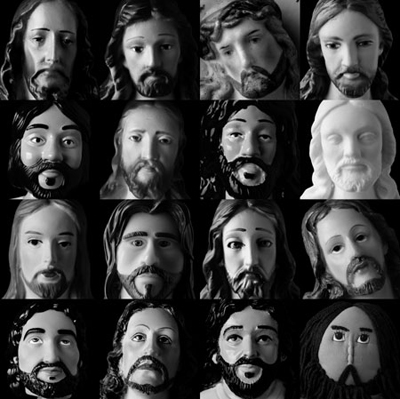Today the Jesus Blog is very pleased to host a guest post from
Prof Joan Taylor of King's College, London, addressing the significance of Jesus for the current tragedies associated with the Syrian Refugees.
________________________________
Joan E. Taylor
Professor of Christian Origins and Second
Temple Judaism
King’s College London
The unstoppable force of refugees
fleeing to Europe has in various places hit the immovable object of an attitude
that there is no room at the inn. Spaces are filled. Migrants should be kept
out, in order to preserve jobs, health and welfare services. In an environment
of austerity, where economic cuts have hit people hard, this cold-heartedness
in part derives from a deep sense of insecurity.
At this time it is worth
remembering that Jesus of Nazareth is in the Bible presented exactly as one
that would be rejected by such European countries: a refugee child.
In the Gospel of Matthew, Jesus’s
(adoptive) father Joseph and mother Mary live in Bethlehem, a town in Judaea
near Jerusalem. It is assumed to be their home village. Certain magoi (‘wise men’/astrologers) come from
‘the East’ to Herod, the Roman client king of Judaea, looking to honour a new
ruler they have determined by a ‘star’, and Jesus is identified as the one. All
this is bad news to Herod, and Herod acts in a pre-emptive strike against the
people of Bethlehem and its environs. He
kills all boys under two years of age in an atrocity that is traditionally
known as ‘the massacre of the innocents’ (Matthew 2.16-18).
 |
| Photo Wikimedia Commons |
|
But Joseph has been warned beforehand
in a dream of Herod’s intentions to kill little Jesus, and the family flees to
Egypt. It is not until Herod is dead that Joseph and Mary dare return, and then
they avoid Judaea: Joseph ‘was afraid to go there’ (Matthew 2.22) because
Herod’s son is in charge. Instead they find a new place of refuge, in Nazareth
of Galilee, far from Bethlehem.
Jesus’s earliest years were then,
according to the Gospel of Matthew, spent as a refugee in a foreign land, and
then as a displaced person in a village a long way from his family’s original
home.
Scholars of the historical Jesus can
be suspicious of this account, as also with the other nativity account in the
Gospel of Luke 1-2. It is clearly constructed with allusions to Jesus as a kind
of Moses figure: just as Moses was under threat from an evil Pharaoh who killed
children (Exodus 1-2), so was Jesus. But while resonances with the scriptural
precedent are intended, there is no real need for the author to invent the idea
of Jesus being a refugee child somewhere in Egypt to have him being Moses-like.
There is a quote, ‘Out of Egypt I called my son’ (Hosea 11.1), in Matthew 2.15,
but the ‘son’ concerned is historical Israel, not Moses and not the Messiah,
and it sits uncomfortably with the story. The author of Matthew did not need to
build a myth out of such a text.
 |
| Herodion seen from Bethelehem. Photo Joan Taylor |
|
It seems not then unlikely to me
that Jesus’s family, with a lineage traced to the great king David (Matthew 1;
Luke 3.23-38; Romans 1.3; 15.12), opted to flee from Bethlehem, long-standing residence
of the kingly line and their original home. In many traditional societies such
locations of clans are maintained, even with social disruptions. Archaeology
has shown how Herod built a palace complex at Herodion, including his future
mausoleum, nicely overlooking the town of Bethlehem. It was as if Herod was
breathing down Bethlehem’s neck.
The 1st-century Jewish
historian Josephus portrays Herod as paranoid about any possible threat to his
rule. He killed his own sons, and had few qualms about killing anyone else’s.
As Augustus quipped: ‘I would rather be Herod’s pig than his son’ (Macrobius, Saturnalia 2:4, since pigs are not
butchered by Jews).
We know also that Jews fled from
troubles in Judaea of many kinds in the 3rd-1st centuries
BCE, and that Egypt was one of the places they went to as refugees. Josephus comments
on the problematic revolutionaries (and their children) that fled there after
the First Jewish Revolt (66-70 CE; War 7:
407-19), but they were following a well-worn path.
Many epitaphs and inscriptions,
as well as historical sources, testify to a thriving Jewish expatriate
community in Egypt, made up of earlier refugees that could be joined by others.
However, just like today, new refugees were not welcome. A letter of the
emperor Claudius, written in 41 CE, states that Jews in Alexandria lived in ‘a
city not their own’ in which they were ‘not to bring in or invite Jews who sail
down to Alexandria from Syria[-Palaestina]’ (P.London 1912; CPJ I:151).
A remembrance of Jesus’s family
in Egypt is preserved in Matariya, in the suburbs of Cairo at Heliopolis, a
spot understood to be a stopping place on the holy family’s flight, and it is probably
the most important site in the world for anyone wishing to contemplate Joseph,
Mary and Jesus as refugees. http://www.holyfamilyegypt.com/map/Greater%20Cairo/Matariya.htm
For new refugees, as anywhere, life
would have been very hard. The 1st-century Jewish philosopher Philo
of Alexandria tells us of the consequences of poverty, which could result in enslavement
(Special Laws 2.82). Presumably, Jewish
charity and voluntary giving through the synagogue would have helped a struggling
refugee family, but they would also have been reliant on the kindness of
strangers.
The legacy of being a refugee and
a newcomer to a place far from home is something that I think informed Jesus’s
teaching. When he set off on his mission, he took up the life of a displaced
person with ‘nowhere to lay his head’ (Matthew 8.20; Luke 9.58). He asked those
who acted for him to go out without a bag or a change of clothing, essentially
to walk along the road like destitute refugees who had suddenly fled, relying
on the generosity and hospitality of ordinary people whose villages they
entered (Mark 6.8-11; Matthew 10.9-11; Luke 9.3). It was the villagers’ welcome
or not to such poor wanderers that showed what side they were on: ‘And if any
place will not receive you and refuse to hear you, shake off the dust on your
feet when you leave, for a testimony to them’ (Mark 6.11).
__________________
To give to the Red Cross Europe Refugee Crisis Appeal, follow this link.
 Today we welcome the first of our new bloggers to the Jesus
Blog—Dr. Christine Jacobi. Christine is wissenschaftliche
Mitarbeiterin at Humboldt Universität zu Berlin and is a perfect addition to
the Jesus Blog because she is an innovative scholar working in the area of
Jesus tradition in the writings of Paul.
As is standard in the German system, she is currently writing her second
doctorate (Habilitation) under Prof Dr Jens Schröter, whom readers of
the Jesus Blog will recognize as one of the leaders in recent historiographical
shifts in Jesus studies. Christine also
wrote her PhD in Berlin under Schröter, which was published as Jesusüberlieferung
bei Paulus? Analogien zwischen den echten Paulus-Briefen und die synoptischen
Evangelien (de Gruyter, 2015).
In this study, Jacobi argues that restricting consideration of Paul’s
knowledge of the Jesus tradition to mining his epistles for words and sayings
of Jesus from the Synoptics is ill-conceived.
One must, according to Jacobi, be more attuned to Paul’s own
conceptualization of Jesus and the Jesus tradition. Focusing particularly on his usage of “in the
Lord,” she demonstrates that Paul “receives” “Jesus” as more of a hermeneutical
sphere or orientation toward the past than anything else, and thus his
reception of Jesus and Jesus tradition amounts to much more than simply
repeating some words that Jesus may have said.
This study is one of the first applications of the emerging “memory approach” to
the Pauline epistles, and is thus groundbreaking in that and many other
ways. We could not be more pleased to
have Christine join us and we look forward to her contributions. I (Chris) should also mention that I’m
particularly pleased to be working with Christine as a co-editor (along with
Helen Bond and Jens Schröter) of the forthcoming 750,000-word Reception of
Jesus in the First Three Centuries (Bloomsbury T&T Clark). She is also the co-editor (with Jens
Schröter) of the forthcoming Jesus Handbuch (Mohr Siebeck, 2016).
Today we welcome the first of our new bloggers to the Jesus
Blog—Dr. Christine Jacobi. Christine is wissenschaftliche
Mitarbeiterin at Humboldt Universität zu Berlin and is a perfect addition to
the Jesus Blog because she is an innovative scholar working in the area of
Jesus tradition in the writings of Paul.
As is standard in the German system, she is currently writing her second
doctorate (Habilitation) under Prof Dr Jens Schröter, whom readers of
the Jesus Blog will recognize as one of the leaders in recent historiographical
shifts in Jesus studies. Christine also
wrote her PhD in Berlin under Schröter, which was published as Jesusüberlieferung
bei Paulus? Analogien zwischen den echten Paulus-Briefen und die synoptischen
Evangelien (de Gruyter, 2015).
In this study, Jacobi argues that restricting consideration of Paul’s
knowledge of the Jesus tradition to mining his epistles for words and sayings
of Jesus from the Synoptics is ill-conceived.
One must, according to Jacobi, be more attuned to Paul’s own
conceptualization of Jesus and the Jesus tradition. Focusing particularly on his usage of “in the
Lord,” she demonstrates that Paul “receives” “Jesus” as more of a hermeneutical
sphere or orientation toward the past than anything else, and thus his
reception of Jesus and Jesus tradition amounts to much more than simply
repeating some words that Jesus may have said.
This study is one of the first applications of the emerging “memory approach” to
the Pauline epistles, and is thus groundbreaking in that and many other
ways. We could not be more pleased to
have Christine join us and we look forward to her contributions. I (Chris) should also mention that I’m
particularly pleased to be working with Christine as a co-editor (along with
Helen Bond and Jens Schröter) of the forthcoming 750,000-word Reception of
Jesus in the First Three Centuries (Bloomsbury T&T Clark). She is also the co-editor (with Jens
Schröter) of the forthcoming Jesus Handbuch (Mohr Siebeck, 2016).
















